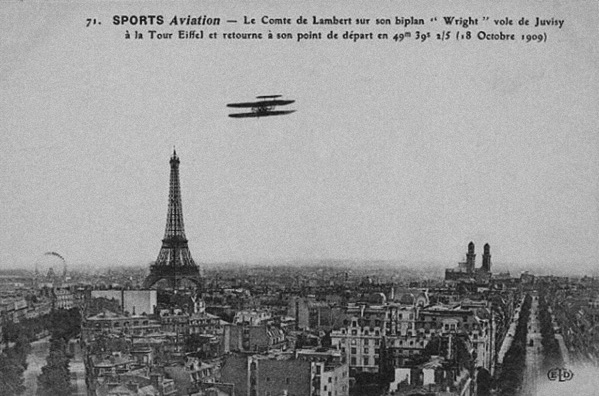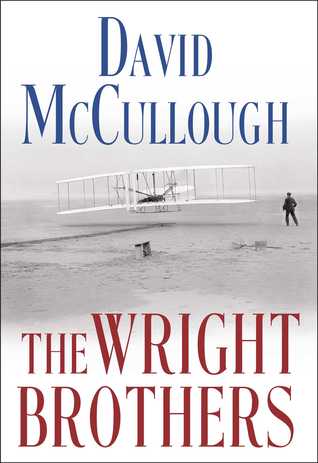On Monday, October 18, 1909 witnesses gasped to see high in the sky over Paris, France, higher than the Eiffel Tower (then the tallest man-made structure on Earth) something never before seen over a major world city: an airplane. This one was a Wright brothers bi-plane piloted by a Wright friend and student, the Comte de Lambert. One witness was the American Pulitzer Prize winning novelist Edith Wharton who recorded her impressions.

It is not her impressions that interest me, nor the flight itself, as remarkable as that must have been. What interests me is that in his recent book The Wright Brothers, David McCullough refers to Ms. Wharton blandly as ‘the American writer Edith Wharton’. This may have been for McCullough nothing more than an incidental word choice. But I like to think that it arose from something deeper: from McCullough’s assessment of his vocation. He wants to be known simply as this: as a writer, a person who tells stories with words. The Presidential Medal of Freedom which McCullough was awarded calls him “…one of our nations most distinguished and honored historians…”. Though no doubt true, he is first and foremost, in his mind, simply a writer.
❦
I grew up in southwest Ohio, forty minutes or so from Dayton. When I was young I spent many enjoyable hours strolling through the magnificent Air Force Museum on the Wright-Patterson Air Force Base. Nevertheless, I had no particular  interest in the sons of Dayton for whom the air force base was named. With the release of David McCullough’s book The Wright Brothers, I have become interested. A good storyteller does that. He compels one to become interested in what interests him.
interest in the sons of Dayton for whom the air force base was named. With the release of David McCullough’s book The Wright Brothers, I have become interested. A good storyteller does that. He compels one to become interested in what interests him.
The basic narrative of the brothers Wilbur and Orville was taught to most school children of my era. These two from Dayton designed and built the first ever airplane, testing and flying it, for some reason never then explained, off the sand dunes of Kitty Hawk, NC. McCullough fills in the rather monstrous gaps in that narrative.
In a 1909 interview with a New York newspaper, Wilbur, reflecting perhaps on his life, said
“A man who works for the immediate present and its immediate rewards is nothing but a fool.”
Ignoring “the immediate present and its immediate rewards”, the brothers attacked the problem of flight like none before them. Further, the design and building of a flying machine was only part of the challenge before them. They also had to learn how to pilot one, knowing that any error along the way could (and almost did) kill them. They worked obsessively, mostly in obscurity, often under great pressure, and sometimes in the face of mockery.
And yet they were not indifferent to immediate rewards. They attracted notoriety, and became acquainted with a wide span of celebrity, nobility, and royalty. But they never let their own celebrity lull them into complacency or rashness. They did not fly to impress, but to succeed. That that they did.
Living until age 77, Orville survived to see both the good and the potential for destruction their invention brought to the world. Wilbur, on the other hand, died of typhoid fever in 1912.
In all the years they had been working together Wilbur and Orville had never once flown together, so if something were to go wrong and one of them should be killed, the other would live to carry on with the work. But on this day at Huffman Prairie, where they had developed the first practical flying machine ever, the two of them, seated side by side, took off into the air with Orville at the controls.
To many then and later, it seemed their way of saying they had accomplished all they had set out to do and so at last saw no reason to postpone any longer enjoying together the thill of flight.” (page 253)
❦
The quality of a story is often found in what is withheld. A good writer does not obscure his story under a weight of detail but keeps his focus and lets the story unfold. I would like to know more about why the brothers were so fastidious about not working on Sunday, and others might want to know greater details about their legal battles. If we all got our wishes, the book would double in size and be half as interesting.
David McCullough’s degree from Yale is in English literature. Whether he qualifies as a historian, I’ll leave to others to decide. Clearly, he is a writer, one for whom I continue to be grateful.
[Footnote point of regional pride: Why does North Carolina gets the cool ‘First in Flight’ license plates? All they provided was isolation, sand, and a prevailing wind for the boys from Ohio to ply their magic!]

Adri
Joined Shores book club; Wright Brothers is selection for February. Plan to read though not certain I can attend. For other club we will discuss 1776 which I’ve read before. Love his writing.
Randy Greenwald
Great selections!
dwightdolby
Hope you don’t mind that I copied your fun post to my FB page.
Randy Greenwald
If you want, you can copy the not so fun posts. The good ones, be sure to attribute to me. The bad ones, you can claim credit for those. 😉